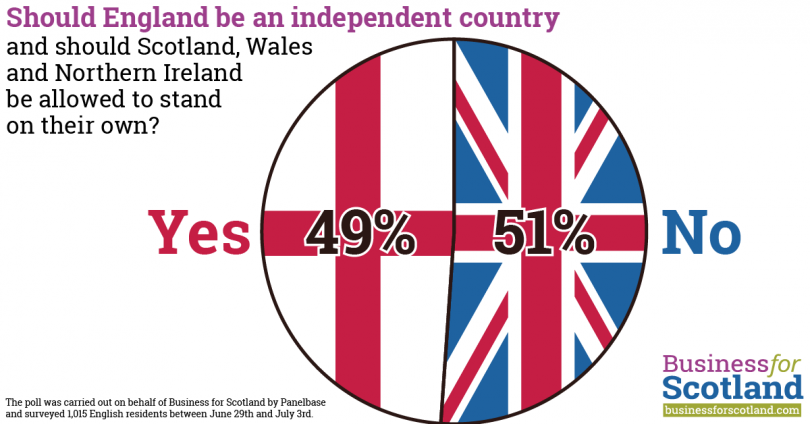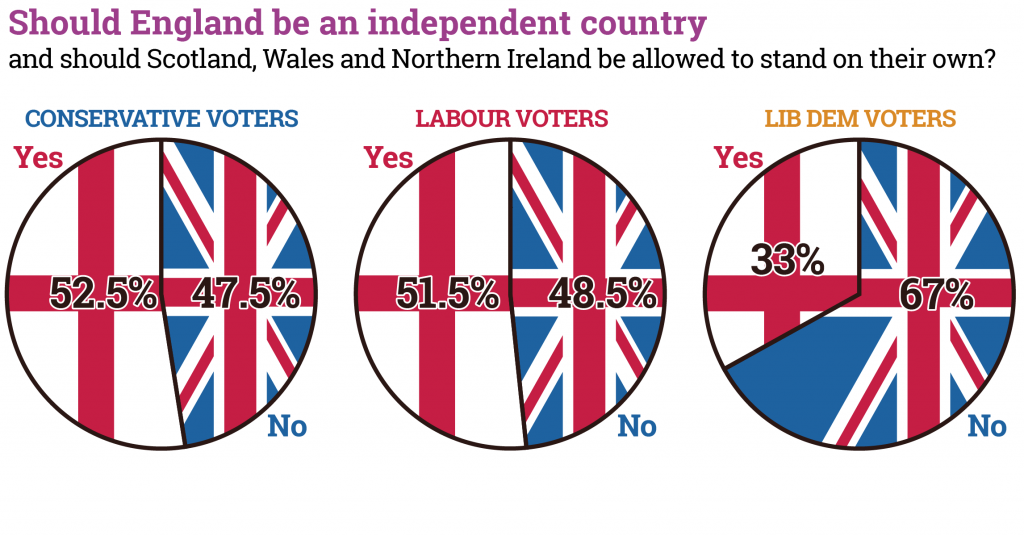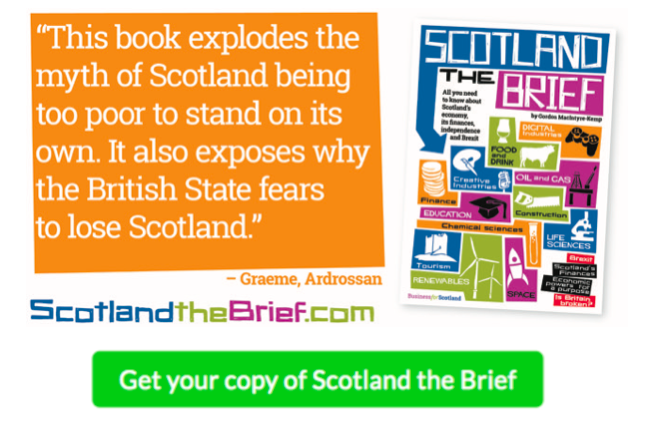The poll was carried out on behalf of Business for Scotland by Panelbase and surveyed 1,015 English residents between June 29th and July 3rd and asked if people agreed or disagreed with the statement: England should be an independent country and Scotland, Wales and Northern Ireland should be allowed to stand on their own two feet.
Let’s be clear, without any serious campaign for English independence and with no political party advocating for such a move, English voters are essentially split right down the middle on whether England should be an independent country. Were such a campaign to be launched we can only assume that support for English independence would grow exponentially.
Thirty six percent of English voters were against English independence and 34% for, with 30% neither agreeing nor disagreeing. When you remove the undecided, that leaves English independence on 49% and support for retaining the Union on 51%.
What really stands out though is that respondents who voted Conservative in the December 2019 General Election were 52.5% in favour of English independence and 47.5% for the Union. That contrasts starkly with Scottish based Conservative voters in the last election who were 94% in favour of the Union. It might come as quite a shock to Scottish Conservatives that their party members across the border are just not that bothered about keeping the Union together. In Scotland, it seems, Conservative voters are British nationalists but in England, the majority are now English nationalists.
Similarly, whereas our previous Panelbase poll of Labour voters in Scotland found that 43% would support independence, this poll discovered that 51.5% of English based Labour voters were in favour of English independence. The evidence is clear, in England the majority of voters for the two main political parties support English independence and therefore the dissolution of the Union.
So, if the Conservative Government’s supporters and the Labour opposition’s supporters would vote for England to become an independent nation then why did we only register 49%? Well, it’s largely down to the Lib Dems; they may have far fewer voters but they are strongly British Nationalist with 67% of them against English independence when you remove the undecided. Even then 31% neither agreed nor disagreed and so even within the Lib Dems there is a huge chunk of their voters that just aren’t that bothered about the Union, hardly a ringing endorsement.
Drilling into the data a bit deeper seems to suggest that wealthy home owning, retired, Liberal Democrats and older females make up the majority of those that support the Union on the English side of the border.
If current trends are to continue then we suspect the first poll to record 55% YES and 45% NO to Scottish independence, a complete reversal of the 2014 result, will be carried out in September this year. Not long after that, we expect support for English independence will also be in the majority.
Already the majority position amongst Conservative voters in previous polls and now in this one with Labour voters too, how long will it be before Boris Johnson (always a populist) will realise that he can position himself as the Father of the new English nation and rid himself of 53 Opposition MPs out of the 59 elected from Scotland or fight a losing fight and be the Prime Minister that lost the Union?










I violently disagree with Scottish independence. However I 4think england should also be consulted and if england vote for separation so be it. This is the element of the equation never mentioned
Interesting. However the divorce will be like all divorces: bitter and acrimonious, leaving both parties considerably worse off. Talk of future “friendship” is delusional. English people are neither blind nor deaf; after ten years of being misrepresented, abused and demonized by the SNP, they will be in no mood for maintaining good relations. But your data is probably correct: England and Wales would surely be happier standing together as a truly independent nation than they would be as a partially devolved province of the United States of Europe. Alas, far too many Scots have failed to recognise that “independence within the EU” is a contradiction in terms. Scotland can certainly be a member of the EU, but to do so she would have to join the single market and customs union, join the single currency, agree to “qualified majority voting”, comply with strict EU fiscal rules which require her to reduce her budget deficit to only 3% of GDP, leave the UK single market which accounts for 60% of her trade, agree to tax harmonisation, agree to “level playing field” rules, agree to the creation of a “common European foreign and defence policy”, and sign up to the principle of “ever closer union”. Of course, many Scots might prefer this to membership of the UK, but “independence” it most certainly is not.